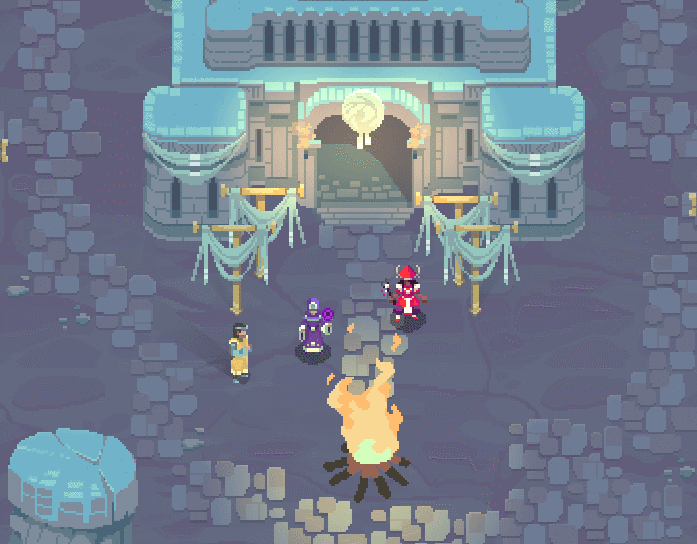The relationship between games and ritual seem an increasingly apparent one. A cognitive anthropologist discovered that for many Chinese WoW players, their time in Azeroth served an important spiritual function as a highly communal experience in an increasingly capitalist/individualistic society. Within five days of Twitch Plays Pokemon beginning its stream, entire sects of religions had risen, warred, and fallen. Even a virtual reality rite of passage already exists—and the Oculus Rift hasn’t even become commercially available yet.
It almost feels like getting enough players in a space together and giving them a goal is all it takes for people to start feeling the spirit within them.
Moon Hunters takes that philosophy to heart. The main mechanic of this action RPG is to build your own mythos, by making choices as a hero that define how (or even if) you’ll be remembered in the legends. Intended (though not exclusively) as a local co-op game, Moon Hunters combines the individualism of personal growth with the responsibility to one’s community. Sure, the decisions are yours, this is your game and character, and you’re creating your mythology. But the objective of the game remains always to determine “what you embody to those who hear your story in ages hence.”
Importantly, you’re not just defining one hero’s legacy. In Moon Hunters, players accrue an entire pantheon of personalities during the many 2-3 hour playthroughs. The world, though randomly generated whenever a new game beings, is comprised of three major tribes or regions. These tribes embody the elements, residing in biomes such as the desert, mountains, and forests. A fourth, more mysterious and rare tribe called The First People dwell only in the caves, and their society is initially unintelligible to the player. Other than important encounters which define your hero’s personality, these tribes also influence your reputation by testing out your abilities in “tribe-management.”
Moon Hunters is only the latest example of videogames as a journey toward spiritual growth. Ryan Hornbeck (the aforementioned WoW cognitive anthropologist) explains that games are filled with archetypal narratives, which let you “act out these heroic roles with the brain machinery to respond to those things. It facilitates a very powerful connection.”
As the famed 1998, six hour-long interview between renowned mythologist Joseph Campbell and journalist Bill Moyers revealed, ritual has left a hole in modern society. In The Power of Myth, Campbell laments the loss of initiation myths, and Moyers cheekily suggests that coming-of-age rituals are now supplemented by going to the movies:
MOYERS: Given the absence of initiation rituals, which have largely disappeared from our society, the world of imagination as projected on that screen serves, even if in a faulty way, to tell that story, doesn’t it?
CAMPBELL: Yes, but what is unfortunate for us is that a lot of the people who write these stories do not have the sense of their responsibility. These stories are making and breaking lives. But the movies are made simply to make money. The kind of responsibility that goes into a priesthood with a ritual is not there. That is one of our problems today.
MOYERS: We have none of those rites today, do we?
CAMPBELL: I’m afraid we don’t. So the youngsters invent them themselves, and you have these raiding gangs, and so forth—that is self-rendered initiation.
Campbell often emphasized the brutal aspects of these ancient initiations as the symbolic sacrifice of growing up and learning to put community first. That narrative should probably sound familiar to anyone who has played a misunderstood anti-hero in an FPS (hint: it’s all of them ever). And as a traditionally competitive medium, games—like IRL sports—even allow us to fight for dominance amongst each other in relatively inconsequential and (generally) good-natured ways.
But beyond that, innovative co-op systems like Journey reveal their truly transcendent possibility: coming together to achieve a common goal. Though Moyers’ suggestion that entertainment has replaced ritual was probably initially said in jest, Campbell seems genuinely convinced. And I’d wager a bet that anyone who played a co-op game in Journey wouldn’t be too quick to dismiss the idea either.
Rather than watching reenactments of initiation myths on a cave wall, modern society instead watches coming-of-age tales like Boyhood and Mean Girls at the movie theater. As a society, we literally buy into the growing-up myths we want to collectively believe in, by casting our vote with the purchase of an $11.99 ticket. That’s not necessarily a bad thing, either. But, as Campbell points out, I’d rather a priest or a priestess be given that kind of responsibility than a Hollywood producer.
But since we’re running low on priestesses, perhaps the more self-directed storytelling methods of an RPG really could be the solution. Better yet, a local co-op RPG. As the more active form of entertainment consumption, videogames are undoubtedly the more comparable replacement for ritual. Stories in games even share the oral tradition’s tendency toward dynamic, action-oriented, and branching narratives.
Kitfox Games, the creators of Moon Hunters, encourages potential backers of their kickstarter campaign to try out one of their previous games, Dungeons of Fayte, as a preview of their base system. You might recognize many of Kitfox’s core team as the same developers from Shattered Planet. Though they’re partnering with Square Enix Collective, they’ve received no funding to make the game.
Moon Hunters hopes to launch sometime in the summer of 2015 on PC, Mac, and potentially Linux.
